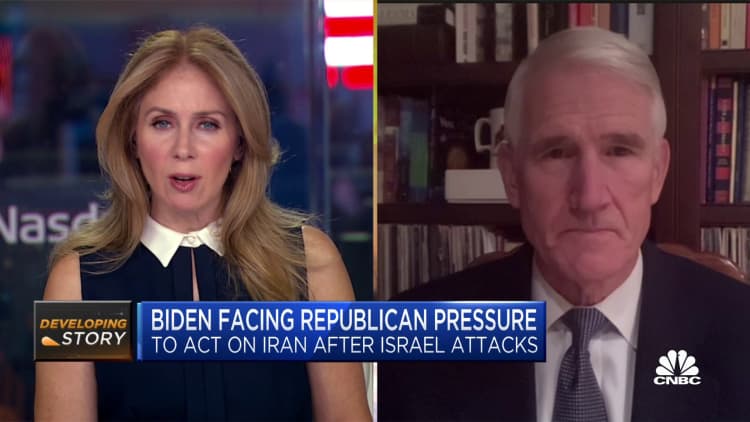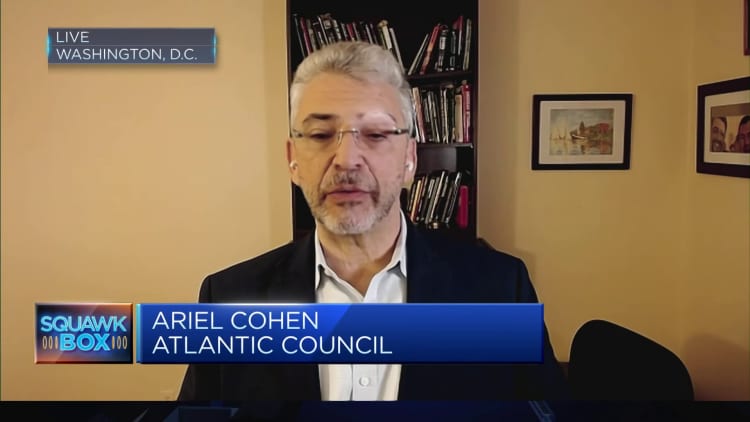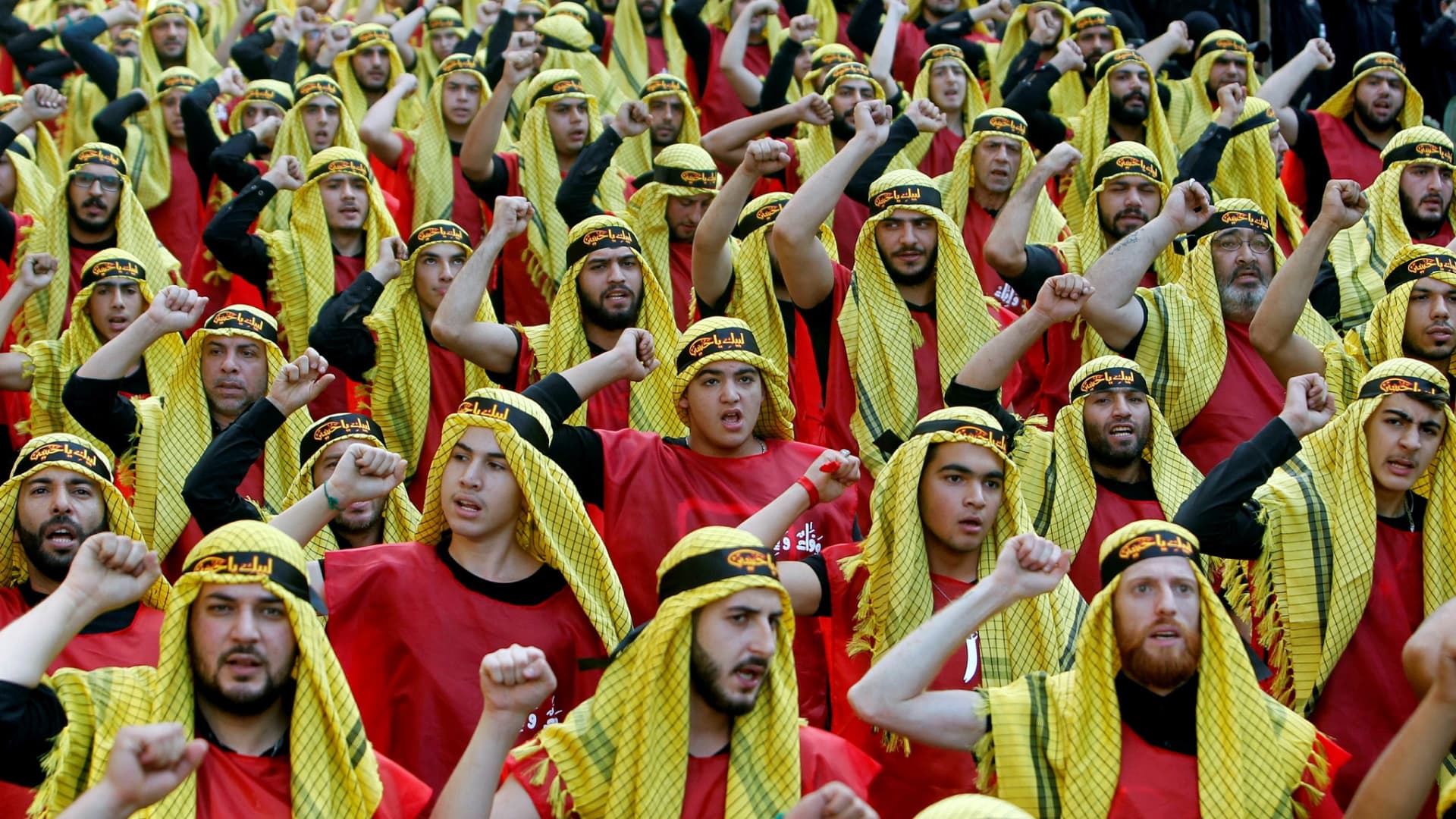Supporters of Lebanon’s Hezbollah party parade to mark the last day of Ashura ceremony in Beirut.
Aziz Taher
An exchange of fire between Lebanese militant group Hezbollah and the armed forces in northern Israel signal that the conflict in Gaza could spread regionally.
With an Israeli ground incursion potentially imminent in the north of the Gaza Strip, the conflict could grow to involve other regional actors, including Hezbollah and potentially Iran, analysts say.
And if Hezbollah decides to join the conflict in neighboring Israel, “it will be nothing short of a game-changer,” Firas Maksad, a senior fellow at the Middle East Institute, told CNBC on Wednesday.
“Hamas is but the weak underling of Hezbollah, a much more formidable fighting force and widely recognized as the most powerful nonstate military in the world,” he added. “This will be a game-changer, not only for Israel, but also for the entire region.”
Political party and paramilitary group
Hezbollah operates as both a political party and paramilitary group and is designated by the U.S. as a terrorist organization. It holds a great deal of power in Lebanon in the form of its Shiite political party, which holds 62 seats in the country’s Parliament, alongside its Iran-backed proxy militant unit.
Hezbollah, or the “Party of God,” was established during Lebanon’s civil war in 1982 with backing from Iran and support from Iran’s Revolutionary Guard. The group strengthened after a war with Israel in 2006, and its military wing has grown to overtake Lebanon’s army as the main military force in the country.
Now, experts say, Hezbollah doesn’t have the domestic popular support it had in 2006 to support a military operation in Israel’s current war with Hamas.
Joseph Daher, author of “Hezbollah: The Political Economy of Lebanon’s Party of God,” told CNBC that Hezbollah “has become not only a key Lebanese political and military actor, it has become a key regional actor.” But he says the country’s Christian community are against or critical of Hezbollah.
“It’s the scale of it, that will depend on Hezbollah intervening or not,” Daher told CNBC. The group “has accumulated huge experience, especially on the Syrian military scene, but also in Iraq and to a lesser extent Yemen,” Daher added.
He explained that Hezbollah is “intrinsically ideologically, politically, militarily [and] economically linked to Iran,” while also being a Lebanese actor with its own autonomy.

Hilal Khashan, a professor of political science at the American University of Beirut and the author “Hizbullah: A Mission to Nowhere” told CNBC that the militant group would hesitate to join the fight in full force.
“Irrespective of [Israeli Prime Minister Benjamin] Netanyahu’s decision, Hezbollah will not open a front from south Lebanon against Israel because it will justify Israel to destroy Lebanon. Iran has already informed Israel and the U.S. through third parties that it will rein in Hezbollah,” he said.
On Friday, Hezbollah’s deputy chief, Naim Qassem, said his party was “fully ready” to contribute to the fighting, according to Reuters. “The behind-the-scenes calls with us by great powers, Arab countries, envoys of the United Nations, directly and indirectly telling us not to interfere will have no effect,” he said at a rally, according to a translation by the news agency.
Lebanon crisis
Lebanon is facing its worst economic crisis in history, with triple-digit inflation and a currency that has lost more than 90% of its value since the onset of an economic crisis in 2019. Almost three-quarters of the Lebanese people live below the poverty line.
The group rules over Lebanon with an iron fist, controlling most border crossings and wielding significant political influence, using its power to block key political appointments. Already spent from fighting alongside President Bashar Assad in Syria, as well as in Iraq and Yemen, a fresh front in Israel for Hezbollah could be crushing for the group, and experts say Iran may not want to use its strongest international militia fighting a fresh front in Gaza or in Israel to defend Hamas.
Hezbollah “do have to take into consideration public opinion in Lebanon,” Maksad told CNBC. Hezbollah’s own constituencies “are suffering war fatigue” and are “under the pressure of Lebanon’s financial collapse,” he added.

Netanyahu has hinted he will launch a ground invasion in Gaza in the coming days. In solidarity, the Biden administration has sent support in the form of a carrier strike group positioned in the Eastern Mediterranean, along with the U.S. secretary of State. The U.S. is “doing its utmost to try and deter Hezbollah and Iran from entering the war,” Maksad told CNBC.
The deployment of the USS Gerald R. Ford is “the administration trying to contain the conflict,” he added.
The threat of Hezbollah’s force looms large in the region and according to professor Khashan, the group’s armed component “is equivalent to a medium-sized European army.”
“It can effortlessly defeat the Lebanese military or occupy Saudi Arabia,” he said, but added that Hezbollah “is trained to fight asymmetric warfare and has no chance against the IDF [Israel Defense Forces] in the event of a total war.”
Denial of responsibility! Vigour Times is an automatic aggregator of Global media. In each content, the hyperlink to the primary source is specified. All trademarks belong to their rightful owners, and all materials to their authors. For any complaint, please reach us at – [email protected]. We will take necessary action within 24 hours.


